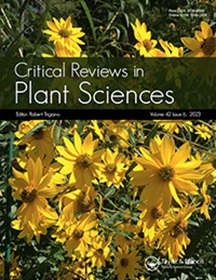Reproductive Mechanisms in Ginkgo and Cycas: Sisters but not Twins
IF 4.9
2区 生物学
Q1 PLANT SCIENCES
引用次数: 0
Abstract
Abstract The study of reproductive mechanisms is of particular interest for a real understanding of seed plant evolution. Spermatophytes comprise angiosperms and four orders of gymnosperms (Cycadales, Ginkgoales, Coniferales, and Gnetales) whose main characteristic is the reproduction via seeds. Ginkgo and cycads form a sister clade to the other gymnosperms and occupy a key phylogenetic position in-between the extinct Paleozoic seed ferns and the other extant gymnosperms. This review focuses on the similarities and differences between the reproductive mechanisms of Ginkgo and Cycas, from the morphogenesis of the male and female organs to the pollination and fertilization events. Together with the morphological and cytological description, the latest available molecular data on the reproductive organ development of the two plant genera are discussed. This will, hopefully, pave the path for new studies aiming at filling the gaps in our understanding of the hormonal and genetic regulation of their reproductive mechanisms. The whole reproductive process is presented in detail, providing a comprehensive and organic picture together with complete illustrations and photographic material. Each phase of the reproductive process is dissected, pointing out the main similarities and differences found among the two genera. The comparison comprises the male and female reproductive organs development, with a focus on pollen ontogeny, shape, ultrastructure, and germination as well as ovule development and patterning, female gametophyte formation, and ovule integument differentiation. Particular attention is given to the pollination and fertilization events focusing on the role of reproductive fluids as well as zoogamy.银杏和苏铁的繁殖机制:姐妹而非双胞胎
摘要繁殖机制的研究对于真正了解种子植物的进化具有特别的意义。精子植物包括被子植物和四目裸子植物(Cycadales、Ginkgoales、Coniferales和Gnetales),其主要特征是通过种子繁殖。银杏和苏铁是其他裸子植物的姐妹分支,在已灭绝的古生代种子蕨类植物和其他现存裸子植物之间占据着关键的系统发育位置。本文综述了银杏和苏铁生殖机制的异同,从雄性和雌性器官的形态发生到授粉和受精事件。结合形态学和细胞学描述,讨论了关于这两个植物属生殖器官发育的最新分子数据。希望这将为新的研究铺平道路,旨在填补我们对其生殖机制的激素和基因调节的理解空白。详细介绍了整个生殖过程,提供了一幅全面而有机的画面,以及完整的插图和摄影材料。对生殖过程的每个阶段进行了剖析,指出了这两个属之间的主要相似之处和差异。比较包括雄性和雌性生殖器官的发育,重点是花粉的个体发生、形状、超微结构和萌发,以及胚珠的发育和模式、雌性配子体的形成和胚珠珠被的分化。特别关注授粉和受精事件,重点关注生殖液的作用以及动物交配。
本文章由计算机程序翻译,如有差异,请以英文原文为准。
求助全文
约1分钟内获得全文
求助全文
来源期刊
CiteScore
12.90
自引率
1.40%
发文量
15
审稿时长
>12 weeks
期刊介绍:
Critical Reviews in Plant Sciences focuses on presenting in-depth and up-to-date reviews of timely and/or cutting-edge subjects in the broad discipline of plant science, ranging from molecular biology/biochemistry through the areas of cell biology, plant pathology and physiology, genetics, classical botany, and ecology, to practical agricultural applications. Articles in the journal provide an up-to-date literature base for researchers and students, pointing the way towards future research needs. The journal is also a significant source of credible, objective information to aid decision makers at all levels.

 求助内容:
求助内容: 应助结果提醒方式:
应助结果提醒方式:


